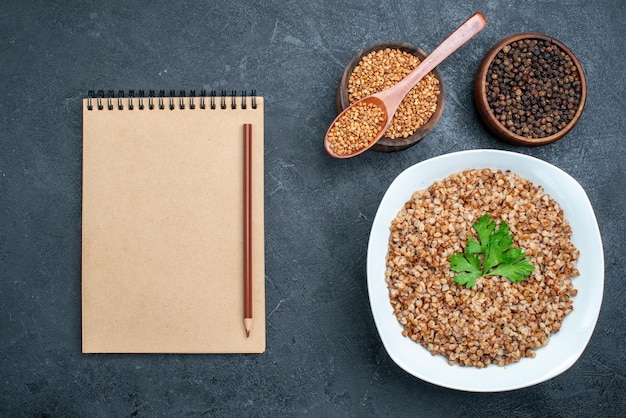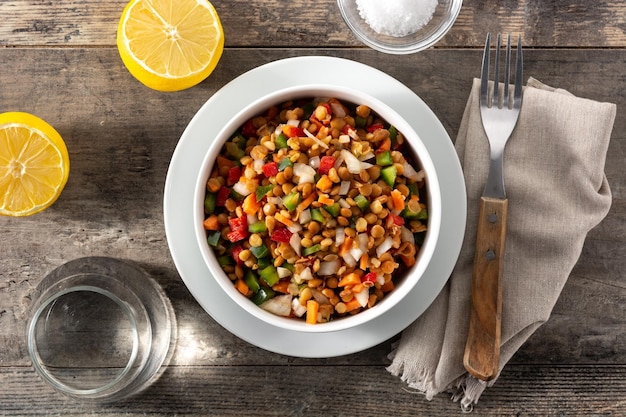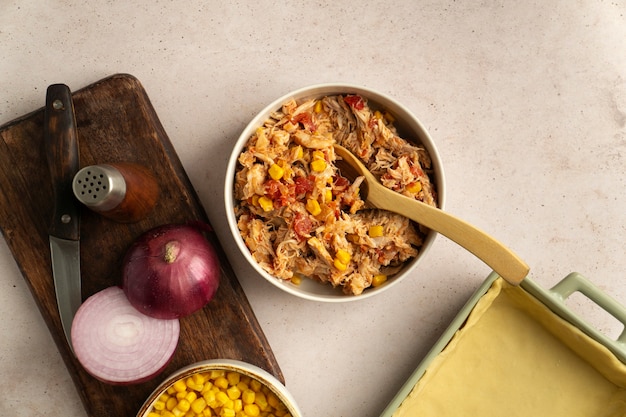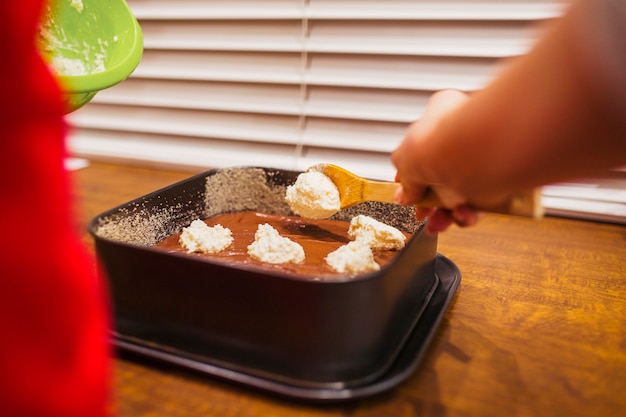(Part 1) Understanding Farro: A Deep Dive into the Wonderful World of This Ancient Grain

Farro Perlato:
Think of this as the "easy-going" farro. It's the most popular type because the outer bran layer is removed, giving it a pearl-like appearance. This makes it cook quicker and have a softer texture, perfect for salads or dishes where you want a subtle grain presence.
Farro Semola:
This farro is a bit more "wild" than its pearled cousin. It still has its bran layer intact, which gives it a chewier texture and a more pronounced nutty flavour. It's a good choice for hearty soups, stews, or grain bowls where you want a bit more bite.
Farro "Whole":
This is the "authentic" farro, with all the bran and germ intact. It takes the longest to cook and has the chewiest texture, offering the most intense flavour. Think of this farro as the "marathon runner" of the group, requiring a bit more patience and effort, but rewarding you with a hearty, rustic taste.
The versatility of farro is truly remarkable. It's a natural in salads, soups, grain bowls, and even desserts. But what truly makes it a culinary hero is its ability to be cooked ahead of time. This makes it a lifesaver for busy weeknights when you need a quick and healthy meal.
(Part 2) Choosing the Right Farro for Your Recipe

- For salads: Choose farro perlato for its softer texture. It absorbs dressings beautifully and holds its shape nicely, creating a satisfying base for your salad creations.
- For soups: Farro semola is a perfect choice for its firmer texture. It adds a satisfying bite to your soup and won’t become mushy during cooking.
- For grain bowls: Opt for farro "whole" for its chewy texture and nutty flavour. It adds a rustic touch to your grain bowls, offering a hearty and satisfying base for your culinary masterpiece.
(Part 3) cooking farro: A Step-by-Step Guide to Perfection

What you'll need:
- Farro (any type, but see above for recommendations)
- Water
- Salt
- Large pot
Let's get started:
- Rinse the farro thoroughly in a fine-mesh sieve. This is an essential step to remove any dust or debris that might be clinging to the grains.
- In a large pot, combine the farro with 3 cups of water for every 1 cup of farro. Add a generous pinch of salt. This ensures that your farro will cook evenly and develop a nice flavour.
- Bring the mixture to a boil over high heat. This kickstarts the cooking process and helps the farro absorb the water properly.
- Reduce heat to a simmer, cover the pot, and cook for 20-30 minutes. Farro perlato takes around 20 minutes, farro semola about 30 minutes, and farro "whole" can take up to 45 minutes. Be patient, and don't be tempted to peek too often!
- When the farro is cooked, it should be tender but still have a slight bite. This is the sweet spot! Remove from heat and let it sit, covered, for 5 minutes. This allows the farro to finish cooking and absorb any remaining moisture.
- Fluff the farro with a fork and serve. The fluffy texture adds to the overall appeal and ensures the flavours are evenly distributed.
And there you have it! You've just cooked perfect farro, ready for all sorts of culinary adventures.
(Part 4) Mastering Farro Texture: Tips and Tricks
Everyone has their own preferences when it comes to texture, so don’t feel pressured to stick to the "al dente" standard. It's all about finding what you love!For a softer, fluffier texture:
Cook the farro a little longer, maybe an extra 5 minutes. You can also add a little bit of butter or olive oil to the cooked farro, which will help it to become more tender and creamy. This is a great option for salads or dishes where you want a smoother texture.
For a firmer, chewier texture:
Reduce the cooking time by a few minutes. You can also add a little bit of cold water to the cooked farro to cool it down quickly, which will help to preserve its texture. This is perfect for grain bowls, soups, or dishes where you want a more pronounced bite.
Tips and Tricks for Perfect Farro:
- Don't overcook farro. It's easy to go overboard, so check it regularly towards the end of cooking. It should be tender but still have a slight bite.
- Don't rinse the cooked farro. The starch helps to create a creamy, satisfying texture. It's best to leave it in!
- Store leftover cooked farro in the refrigerator for up to 3 days. It can also be frozen for up to 3 months. This makes farro a super convenient ingredient for meal prep.
(Part 5) farro recipes: Delicious Inspiration for Every Palate
Alright, now that we’ve covered the cooking basics, let’s get to the good stuff – the recipes! These are some of my personal favourites that I know you'll love.1. farro salad with Roasted Vegetables
This is a classic for a reason. The roasted vegetables add a delightful sweetness, while the farro provides a satisfying base. It's the perfect combination of flavours and textures.
Ingredients:
- 1 cup cooked farro (any variety will do!)
- 1 cup roasted vegetables (such as broccoli, bell peppers, zucchini, onions, etc.) – experiment with your favourites!
- 1/2 cup crumbled feta cheese – adds a salty and tangy kick.
- 1/4 cup chopped fresh herbs (such as parsley, mint, or dill) – adds freshness and vibrancy.
- 1/4 cup olive oil – for a rich and satisfying flavour.
- 2 tablespoons lemon juice – adds a bright and tangy twist.
- Salt and pepper to taste – adjust to your preference.
Instructions:
Toss all of the ingredients together in a large bowl and enjoy! It's that simple.
2. farro soup with Mushrooms and Kale
This hearty soup is perfect for a chilly evening. The mushrooms add a rich depth of flavor, and the kale provides a boost of nutrients. It's the perfect comfort food with a nutritional edge.
Ingredients:
- 1 cup cooked farro (choose your favourite variety)
- 1 tablespoon olive oil
- 1 onion, chopped
- 2 cloves garlic, minced
- 1 pound mushrooms, sliced – any kind will do!
- 4 cups vegetable broth – or chicken broth if you prefer.
- 1 cup chopped kale
- Salt and pepper to taste – adjust to your taste preferences.
Instructions:
In a large pot, sauté the onion and garlic in olive oil until softened. Add the mushrooms and cook until softened. Pour in the vegetable broth, bring to a boil, and then reduce heat to low. Simmer for 15 minutes. Stir in the farro and kale. Cook for an additional 5 minutes or until the kale is wilted. Season with salt and pepper to taste.
3. farro risotto with Asparagus and Parmesan
This is a twist on the classic risotto, featuring the nutty flavour of farro and the fresh taste of asparagus. It’s a delicious and elegant dish that’s sure to impress.
Ingredients:
- 1 cup cooked farro (any variety will work)
- 1 tablespoon olive oil
- 1 onion, chopped
- 2 cloves garlic, minced
- 1 cup white wine
- 4 cups vegetable broth – or chicken broth if you prefer
- 1 bunch asparagus, trimmed and chopped
- 1/2 cup grated Parmesan cheese – adds a rich, creamy flavour.
- Salt and pepper to taste – adjust to your taste preferences.
Instructions:
In a large saucepan, sauté the onion and garlic in olive oil until softened. Add the white wine and cook until almost evaporated. Gradually add the vegetable broth, one cup at a time, stirring constantly until each cup is absorbed before adding the next. Once the farro has absorbed most of the broth, add the asparagus and cook for 5 minutes or until tender. Stir in the Parmesan cheese, season with salt and pepper to taste, and serve immediately.
4. farro and chickpea salad with Lemon and Herbs
This salad is light and refreshing, perfect for a summer lunch or a side dish. It's packed with protein and fiber thanks to the chickpeas and farro, making it a healthy and satisfying meal.
Ingredients:
- 1 cup cooked farro (choose your favourite variety)
- 1 can chickpeas, rinsed and drained
- 1/2 cup chopped cucumber
- 1/4 cup chopped red onion
- 1/4 cup chopped fresh parsley
- 1/4 cup chopped fresh mint
- 2 tablespoons lemon juice – adds a bright and tangy flavour.
- 2 tablespoons olive oil – for a rich and satisfying flavour.
- Salt and pepper to taste – adjust to your taste preferences.
Instructions:
Combine all of the ingredients in a large bowl and toss to coat. Serve chilled.
(Part 6) Farro: The Perfect Canvas for Your Culinary Creativity
Farro is incredibly versatile. It can be used in countless ways, taking on the flavors of its companions and creating a symphony of taste. Think of it as a blank canvas, waiting for your artistic culinary touches.Here are some tips for making farro your own:
- Experiment with different flavor combinations. Try adding different herbs, spices, vegetables, and cheeses to your farro dishes. The possibilities are endless! For example, try adding smoked paprika and cumin to your farro for a smoky flavour, or add some chopped walnuts and dried cranberries for a sweet and nutty flavour.
- Don't be afraid to go beyond the traditional. Farro can be used in sweet dishes, too. Consider a farro pudding or a farro crumble for a unique twist.
- Think outside the box! Farro can be used in burgers, meatballs, or even as a filling for stuffed peppers.
(Part 7) Farro: Beyond the Plate
Farro's benefits go beyond its deliciousness. It's a nutritional powerhouse, packed with protein, fiber, and essential nutrients. But did you know it's also a sustainable and eco-friendly grain?Here are some of farro's hidden gems:
- High in protein: Farro is a good source of protein, making it a satisfying and filling ingredient.
- Rich in fiber: It's packed with fiber, which helps to regulate digestion and keep you feeling full.
- Full of nutrients: It's rich in vitamins and minerals, including magnesium, iron, and zinc.
- Gluten-free: While farro is a type of wheat, it's naturally low in gluten. People with gluten sensitivity can often tolerate farro.
- Sustainable and eco-friendly: Farro is a sustainable grain that requires less water than other types of wheat. It's also a good source of antioxidants.
(Part 8) FAQs: Your Farro Questions Answered
I know you're probably wondering about some of the more common farro questions. Don't worry, I've got you covered!1. Can I cook farro in the instant pot?
Absolutely! You can cook farro in the Instant Pot using the same ratio of farro to water as you would for stovetop cooking. Cook on high pressure for 10 minutes for farro perlato and 12 minutes for farro semola or "whole" farro. Let the pressure release naturally for 10 minutes before releasing the remaining pressure manually. This is a great way to save time and energy while still achieving perfect results.
2. Can I use farro in place of other grains like rice or quinoa?
Definitely! Farro can be a great substitute for rice or quinoa in many recipes. Just remember to adjust the cooking time and water ratio accordingly.
3. How long can I store cooked farro in the refrigerator?
You can store cooked farro in the refrigerator for up to 3 days. Just make sure to store it in an airtight container. This will help to keep it fresh and prevent it from drying out.
4. Can I freeze cooked farro?
Yes, you can freeze cooked farro for up to 3 months. Thaw it in the refrigerator overnight before using it. This is a great way to make meal prep even easier!
5. What are some good ways to use leftover farro?
Leftover farro is a great base for all sorts of dishes. You can use it in salads, soups, stir-fries, or even make a farro frittata.
(Part 9) The Final Word: Embrace the Farro Adventure
So there you have it! You are now a farro expert. Ready to take on the world of this amazing grain? Remember, the beauty of farro is its versatility. It's a blank canvas for your culinary creativity, so go forth and experiment! Create your own signature farro dish and share it with the world. Happy cooking!Everyone is watching

How to Cook Frozen Lobster Tails Perfectly: A Step-by-Step Guide
RecipesLobster. Just the word conjures up images of lavish meals, special occasions, and a taste of luxury. But let's...

Pigs in a Blanket Cooking Time: How Long to Bake for Perfect Results
RecipesAh, pigs in a blanket. Just the name conjures up images of those delightful little parcels of crispy pastry en...

Pork Fillet Cooking Time: How Long to Cook It Perfectly
RecipesPork fillet, or tenderloin as it's sometimes called, is a real favourite in our house. It's so versatile, and...

The Ultimate Guide to Cooking Delicious Frankfurters
RecipesLet's face it, we all love a good frankfurter. It's a classic, simple, and always satisfying. But let's be rea...

Wolf Meat Recipes: A Guide to Cooking Wild Game
RecipesLet's be honest, you don't see wolf meat at your local butcher shop every day. It's a bit of a wild card, but ...
